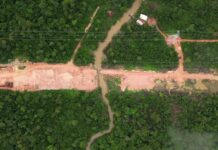The assassination of Charlie Kirk, founder of Turning Point USA, remains a national tragedy — and a growing symbol of how institutional complacency, bureaucratic red tape, and political sensitivities can create fatal blind spots in the realm of event security. Now, new revelations from Brian Harpole, owner of Integrity Security Solutions, are raising pressing questions about what could have been done to protect Kirk that day — and why it wasn’t.
In a powerful and deeply sobering interview on The Shawn Ryan Show, Harpole explained that his hands were tied by federal aviation laws and restrictive state regulations, even though his team had taken proactive steps to modernize security operations. Harpole had invested in drone technology, obtained proper licenses, and trained his personnel for aerial surveillance — only to find the entire toolkit useless due to FAA and Utah state restrictions.
“I spent thousands of dollars on drones last year and got my guys licenses,” Harpole said. “But… I can’t fly. It’s a 107B, we can’t break the rules.”
And here’s the cruel irony: the drones weren’t illegal — they just couldn’t be used in that time and place. FAA Part 107 Subpart B prohibits drone operations over large groups of people without overhead shelter, a condition clearly present at Utah Valley University on September 10, the day Kirk was killed. Utah law, in turn, mirrors those same restrictions. Harpole could only watch, knowing he had the tools to offer aerial coverage — and yet was legally forbidden to deploy them.
Even worse, local law enforcement had the authority and equipment to provide overwatch, but apparently no request was made. Harpole says he asked the Orem Police Department — which had both drones and an active drone unit — whether they had been asked to assist. The answer? No. Utah Valley University’s police never filed the request.
“Did you ask this awesome PD that would probably help you in a heartbeat?” Harpole said, exasperated.
While Harpole praised the Orem PD’s professionalism and willingness to help, a lack of coordination between university police and city law enforcement meant one of the most basic pillars of security — situational awareness — was severely compromised. No drones, no rooftop surveillance, no overwatch.
“This is not a State Department job,” Harpole emphasized. “I don’t have an ITAR and this isn’t Iraq. This is Utah. I can’t go in and set up observation points with snipers.”
In other words, security professionals operating within U.S. borders are often more limited in their defensive capabilities than those working in warzones abroad.
Compare that to what happened just a year earlier at a Trump rally in Butler County, Pennsylvania, when a would-be assassin opened fire on the former president. A Secret Service sniper eliminated the threat, but only after one man was killed and two others injured. The incident highlighted the importance of overwatch, especially in open-air political events.
Charlie Kirk didn’t have Secret Service protection. But what he should have had was institutional support, cooperative local law enforcement, and the green light to deploy existing resources designed to keep high-profile speakers safe.
Instead, what Harpole and his team were left with was a checklist of all the things they weren’t allowed to do.
Now, the tragic result of those limitations is plain to see. Kirk is gone. The country is reeling. And for those tasked with protecting him, the haunting question remains: If the rules had allowed it, could we have stopped it?



